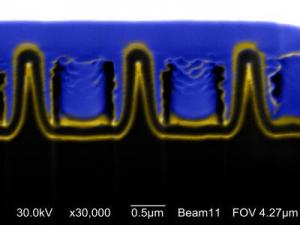Jun 11 2010
Researchers of Boston College have found a new method to resolve the problem of “thick & thin” in the solar cells. The new way found by the physicists is to build a nano-scale solar cell based on the coaxial cable, which is an old radio technology concept that was used in the laying of first trans-Atlantic lines during the 19th century. The research report is available online in the latest edition of the Physica Status Solidi journal.
 Boston College
Boston College
The coaxial cable-based solar cell provides more efficiency than other nanotechnology-based thin film solar cells. The challenge of “thick & thin” is related to the solar cell’s ability in harnessing solar light and generating current. Higher conversion efficiency from thin film solar cells was unachievable due to electronic and optical constraints. A solar cell needed enough thickness to gather sufficient solar light as well as enough thinness to extract current.
The nanocoax resolves the problem as it is thick enough to harness solar light and thin enough to facilitate more current extraction, according to the report released by researchers in the PSS Rapid Research Letters. The nanocoax technology was invented by the Boston researchers in 2005 and it has been patented in 2009. The newly developed nanocoax solar cells yield more than 8% of power conversion efficiency.
The co-author of the research report and a physics professor at Boston College, Michael Naughton said that many research teams are working on nanowire solar cells, from which most of them using crystalline technology. The nanocoax cell architecture does not need crystalline materials, hence offers cost-effective solar power. He added that it is possible to achieve efficiencies beyond conventional planar architectures using less quantity of economic materials and continuous optimization.